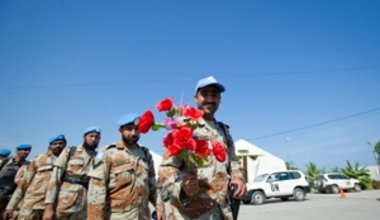PRESS RELEASE DELIVERY OF SENSITIVE MATERIAL FROM DILI TO THE DISTRICTS
On the 30th June 2007, STAE carries out the delivery of the sensitive electoral materials to the districts, including the ballot papers. In total, 652000 ballots were produced and will ultimately be distributed to the 708 polling stations throughout the country. The number of ballots was calculated using the number of voters who were able to vote in the last elections, plus an additional 20% of ballots. Ballots were printed in Indonesia under the supervision of representatives of STAE, CNE, UNMIT and UNDP, who also funded their production.
For this electoral operation, STAE will use 346 vehicles from different sources: governmental vehicles, UNMIT vehicles, UNDP vehicles and some specially provided by IOM. From Dili to the districts, the ballots will be escorted by PNTL and UNPOL, to ensure they are not tampered with along the way.
These legislative elections differ in some aspects from the last Presidential elections, mainly in the presence of mobile teams in hospitals and prisons and the fact that counting that will now take place in district Counting Centres instead of at polling stations. With this new measure, it will be impossible to identify how a specific Polling Station voted and therefore will help in preventing potential conflicts and reactions. This information has been widely publicized by Voter Education activities and posters that will be put up at Polling Centres.
Regarding the new counting procedures, STAE provided a specific training to the electoral officers chosen by lottery to be part of the counting: around 700 brigadas and Presiding Officers out of a total of 4000 polling staff. The training took place in all the district capitals on the 22 and 23 June with the participation of UNMIT, STAE and CNE in each district.
Once again STAE faces the challenge of organising a huge logistical operation in a country with weak means of communication and many areas that are difficult to access, often in adverse weather conditions and heavy rain.
"We are aware of the huge dimension of the electoral operation, but, after two elections this year, STAE has been able to improve some logistic and operational aspects. With the support of the international electoral advisers and financial support from UNMIT and UNDP, STAE has gained experience which will be essential in the future", stated Tomas Cabral, Director of STAE.
 UN
UN United Nations Peacekeeping
United Nations Peacekeeping


